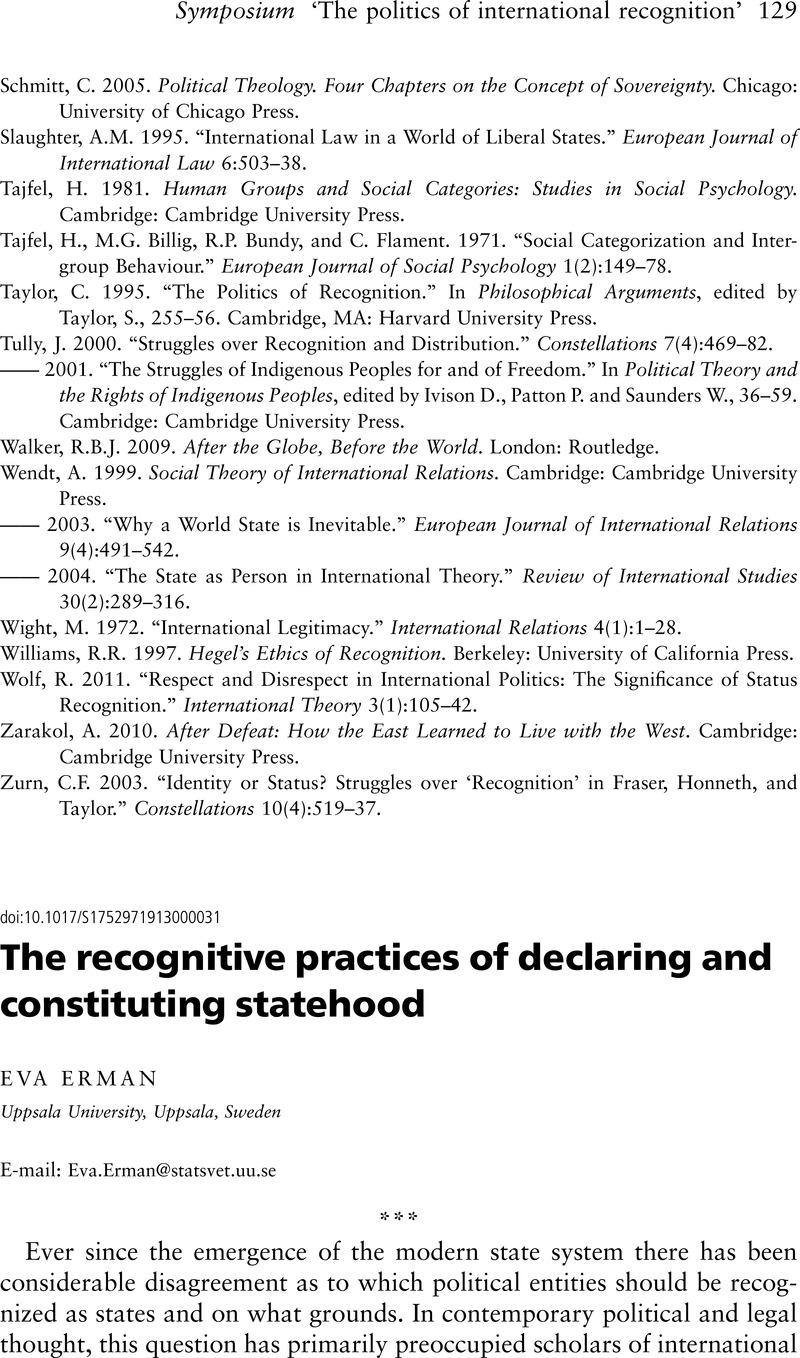Crossref Citations
This article has been cited by the following publications. This list is generated based on data provided by Crossref.
Fabry, Mikulas
2013.
Theorizing state recognition.
International Theory,
Vol. 5,
Issue. 1,
p.
165.
Kessler, Oliver
and
Herborth, Benjamin
2013.
Recognition and the constitution of social order.
International Theory,
Vol. 5,
Issue. 1,
p.
155.
Geis, Anna
Fehl, Caroline
Daase, Christopher
and
Kolliarakis, Georgios
2015.
Recognition in International Relations.
p.
3.
Goerzig, Carolin
and
Hofmann, Claudia
2015.
Recognition in International Relations.
p.
237.
Griffiths, Ryan D.
2017.
Admission to the sovereignty club: the past, present, and future of the international recognition regime.
Territory, Politics, Governance,
Vol. 5,
Issue. 2,
p.
177.
Tudoroiu, Theodor
2017.
Taiwan in the Caribbean: a case study in state de-recognition.
Asian Journal of Political Science,
Vol. 25,
Issue. 2,
p.
194.
오승희
2017.
Japan’s Struggle for Recognition and Sino–Japanese Diplomatic Normalization : A Recognitive Approach to the One-China Principle.
Korean Political Science Review,
Vol. 51,
Issue. 1,
p.
73.
Lee, Shinkyu
2017.
Freedom, the state, and war: Hegel’s challenge to world peace.
International Politics,
Vol. 54,
Issue. 2,
p.
203.
GAUTHIER, RYAN
2019.
Constructing Statehood through Sport: Football, Kosovo, and the Court of Arbitration for Sport.
Canadian Yearbook of international Law/Annuaire canadien de droit international,
Vol. 56,
Issue. ,
p.
220.
Hsieh, Pasha L.
2019.
Rethinking Non-Recognition: Taiwan’s New Pivot to ASEAN and the One-China Policy.
SSRN Electronic Journal ,
Hsieh, Pasha L
2019.
The quest for recognition: Taiwan’s military and trade agreements with Singapore under the one-China policy.
International Relations of the Asia-Pacific,
Vol. 19,
Issue. 1,
p.
89.
Hsieh, Pasha L.
2020.
Rethinking non-recognition: Taiwan’s new pivot to ASEAN and the one-China policy.
Cambridge Review of International Affairs,
Vol. 33,
Issue. 2,
p.
204.
Freedman, Joshua
2021.
The Recognition Dilemma: Negotiating Identity in the Israeli–Palestinian Conflict.
International Studies Quarterly,
Vol. 65,
Issue. 1,
p.
122.
Brundage, Jonah Stuart
2023.
Representation and Recognition: State Sovereignty as Performative.
American Journal of Sociology,
Vol. 128,
Issue. 5,
p.
1335.
Krickel-Choi, Nina C.
2024.
State personhood and ontological security as a framework of existence: moving beyond identity, discovering sovereignty.
Cambridge Review of International Affairs,
Vol. 37,
Issue. 1,
p.
3.
Kopper, Akos
2024.
Ruptures in Depiction—Recognition and Political Cartoons of Putin: From a Strategic Mastermind to the Object of Contempt and Mockery.
Global Studies Quarterly,
Vol. 4,
Issue. 3,
Guzzini, Stefano
Opondo, Sam Okoth
and
Smith, Karen
2024.
Forum on Recognition in Foreign Policy (Analysis) and (The Study of) Diplomacy.
Contexto Internacional,
Vol. 46,
Issue. 2,



